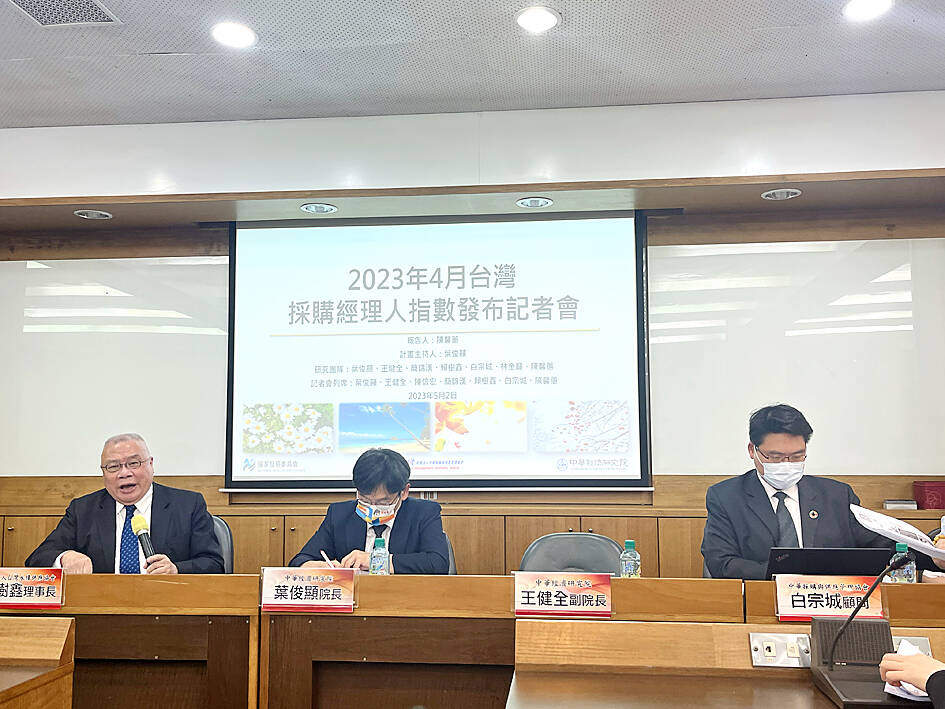The official manufacturing purchasing managers’ index (PMI) last month shed 4.5 points to 42.8, dragged by conspicuous declines in new business orders and industrial production, the Chung-Hua Institution for Economic Research (CIER, 中華經濟研究院) said yesterday.
“Taiwanese manufacturers turned conservative after major chipmakers last month gave weak earnings guidances for this quarter and beyond, while global economic uncertainty shows no signs of easing,” CIER president Yeh Chun-hsien (葉俊顯) told a news conference in Taipei.
Yeh specifically referred to Taiwan Semiconductor Manufacturing Co (台積電), the world’s largest advanced chipmaker, which said on April 20 that inventory adjustments were worse and taking longer than expected due to poor demand for personal computers and smartphones.

Photo: Hsu Tzu-ling, Taipei Times
At the same time, the benefits of China’s reopening are not yet evident, strikes in Europe could slow the pace of recovery and the US Federal Reserve might raise interest rates again this week to tame inflation — all of which would be unfavorable for Taiwan exports, Yeh said.
“The backdrop lends support to a frugal approach in dealing with purchasing activity,” Yeh said.
PMI data aim to measure the health of the manufacturing industry with values of 50 or higher suggesting expansion and scores lower than the threshold indicating contraction.
Most sectors reported a downturn in business last month, except for suppliers of food, textile and raw material products, CIER said, citing a monthly survey of local firms.
The critical subindex on new business orders dropped 3.9 points to 40.6, while the reading for industrial production tumbled 13.5 points to 38.5, as poor sales prompted firms to cut capacity and staff numbers to save on operating costs, the Taipei-based think tank said.
Electronics makers held relatively firm, but vendors of electrical and machinery equipment, and transportation tools fell into contraction, CIER said.
The inventory subindex declined 4 points to 45.9, while the reading for clients’ inventory dropped 2.1 points to 44.9, as firms would rather tighten their belts than replenish inventory, it said.
Tepid demand helped ease raw material prices, with the price measure retreating 4.5 points to 52, CIER said.
Firms in almost all of the manufacturing sectors held a negative view regarding their business prospects, explaining why the six-month outlook dropped 1.3 points to 44.9, it said.
Purchasing activity at service providers gained further momentum, tipping the nonmanufacturing index up by 2.6 points to 55.8, although wholesale operators bucked the trend, the think tank said.
Nonmanufacturing businesses are divided about their business outlook: Hospitality operators, retailers and transportation service providers are upbeat, but property brokers and financial companies expect a soft patch ahead, CIER said.

Taiwan will prioritize the development of silicon photonics by taking advantage of its strength in the semiconductor industry to build another shield to protect the local economy, National Development Council (NDC) Minister Paul Liu (劉鏡清) said yesterday. Speaking at a meeting of the legislature’s Economics Committee, Liu said Taiwan already has the artificial intelligence (AI) industry as a shield, after the semiconductor industry, to safeguard the country, and is looking at new unique fields to build more economic shields. While Taiwan will further strengthen its existing shields, over the longer term, the country is determined to focus on such potential segments as

UNCERTAINTY: Innolux activated a stringent supply chain management mechanism, as it did during the COVID-19 pandemic, to ensure optimal inventory levels for customers Flat-panel display makers AUO Corp (友達) and Innolux Corp (群創) yesterday said that about 12 to 20 percent of their display business is at risk of potential US tariffs and that they would relocate production or shipment destinations to mitigate the levies’ effects. US tariffs would have a direct impact of US$200 million on AUO’s revenue, company chairman Paul Peng (彭雙浪) told reporters on the sidelines of the Touch Taiwan trade show in Taipei yesterday. That would make up about 12 percent of the company’s overall revenue. To cope with the tariff uncertainty, AUO plans to allocate its production to manufacturing facilities in

COLLABORATION: Given Taiwan’s key position in global supply chains, the US firm is discussing strategies with local partners and clients to deal with global uncertainties Advanced Micro Devices Inc (AMD) yesterday said it is meeting with local ecosystem partners, including Taiwan Semiconductor Manufacturing Co (TSMC, 台積電), to discuss strategies, including long-term manufacturing, to navigate uncertainties such as US tariffs, as Taiwan occupies an important position in global supply chains. AMD chief executive officer Lisa Su (蘇姿丰) told reporters that Taiwan is an important part of the chip designer’s ecosystem and she is discussing with partners and customers in Taiwan to forge strong collaborations on different areas during this critical period. AMD has just become the first artificial-intelligence (AI) server chip customer of TSMC to utilize its advanced

Chizuko Kimura has become the first female sushi chef in the world to win a Michelin star, fulfilling a promise she made to her dying husband to continue his legacy. The 54-year-old Japanese chef regained the Michelin star her late husband, Shunei Kimura, won three years ago for their Sushi Shunei restaurant in Paris. For Shunei Kimura, the star was a dream come true. However, the joy was short-lived. He died from cancer just three months later in June 2022. He was 65. The following year, the restaurant in the heart of Montmartre lost its star rating. Chizuko Kimura insisted that the new star is still down